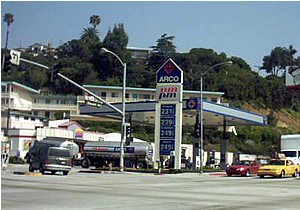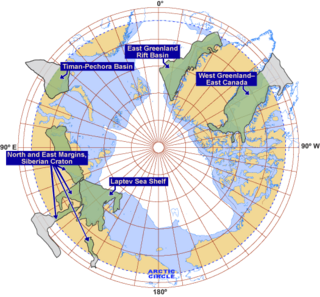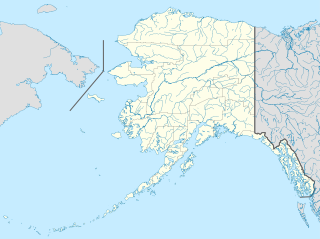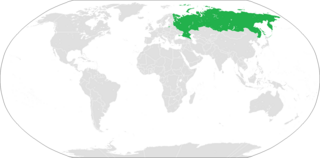
Endicott Island is a 45-acre (18 ha) artificial island located in the U.S. state of Alaska, 2.5 miles (4 km) offshore and 15 miles (24 km) from Prudhoe Bay of the Beaufort Sea. Endicott Island was built in 1987 by Alaska Interstate Construction and is used by BP and Hilcorp Alaska for petroleum production.

An artificial island or man-made island is an island that has been constructed by people rather than formed by natural means. Artificial islands may vary in size from small islets reclaimed solely to support a single pillar of a building or structure, to those that support entire communities and cities. Early artificial islands included floating structures in still waters, or wooden or megalithic structures erected in shallow waters.

In the United States, a state is a constituent political entity, of which there are currently 50. Bound together in a political union, each state holds governmental jurisdiction over a separate and defined geographic territory and shares its sovereignty with the federal government. Due to this shared sovereignty, Americans are citizens both of the federal republic and of the state in which they reside. State citizenship and residency are flexible, and no government approval is required to move between states, except for persons restricted by certain types of court orders. Four states use the term commonwealth rather than state in their full official names.

Alaska is a U.S. state in the northwest extremity of North America, just across the Bering Strait from Asia. The Canadian province of British Columbia and territory of Yukon border the state to the east and southeast. Its most extreme western part is Attu Island, and it has a maritime border with Russia to the west across the Bering Strait. To the north are the Chukchi and Beaufort seas—southern parts of the Arctic Ocean. The Pacific Ocean lies to the south and southwest. It is the largest U.S. state by area and the seventh largest subnational division in the world. In addition, it is the 3rd least populous and the most sparsely populated of the 50 United States; nevertheless, it is by far the most populous territory located mostly north of the 60th parallel in North America: its population—estimated at 738,432 by the United States Census Bureau in 2015— is more than quadruple the combined populations of Northern Canada and Greenland. Approximately half of Alaska's residents live within the Anchorage metropolitan area. Alaska's economy is dominated by the fishing, natural gas, and oil industries, resources which it has in abundance. Military bases and tourism are also a significant part of the economy.
Endicott Island has a permanent causeway connecting it to the mainland, unlike Northstar Island which is too far out for any kind of causeway to be built.

Northstar Island is a 5-acre (20,000 m2) artificial island in the Beaufort Sea, 12 miles (19 km) northwest of Prudhoe Bay, Alaska and 6 miles (9.7 km) north of the Alaska coast. The island was created to develop the Northstar Oil Pool, which is located approximately 12,500 feet (3,800 m) below the seabed. The oil pool was discovered on January 30, 1984 by Royal Dutch Shell.
Endicott Island was the first continuously producing offshore oil field in the Arctic, producing around 20,000 barrels (3,200 m3) of oil per day. Approximately 423 million barrels (67,300,000 m3) had been produced as of March 2003. Processed oil is sent from Endicott Island through a 24-mile (39 km) pipeline to the Trans-Alaska Pipeline, and thence to Valdez, Alaska. [1]
In 1998 and 1999, illegal waste dumping at Endicott Island resulted in combined fines of US$1,500,000 against BP and Doyon Drilling, with further settlements of $24,000,000. In September 1999, one of BP’s US subsidiaries, BP Exploration Alaska (BPXA), agreed to resolve charges related to the illegal dumping of hazardous wastes on the Alaska North Slope, for $22 million. The settlement included the maximum $500,000 criminal fine, $6.5 million in civil penalties, and BP’s establishment of a $15 million environmental management system at all of BP facilities in the US and Gulf of Mexico that are engaged in oil exploration, drilling or production.

The United States dollar is the official currency of the United States and its territories per the United States Constitution since 1792. In practice, the dollar is divided into 100 smaller cent (¢) units, but is occasionally divided into 1000 mills (₥) for accounting. The circulating paper money consists of Federal Reserve Notes that are denominated in United States dollars.

The Alaska North Slope is the region of the U.S. state of Alaska located on the northern slope of the Brooks Range along the coast of two marginal seas of the Arctic Ocean, the Chukchi Sea being on the western side of Point Barrow, and the Beaufort Sea on the eastern. Washington Post
The charges stemmed from the 1993 to 1995 dumping of hazardous wastes on Endicott Island by BP’s contractor Doyon Drilling. The firm illegally discharged waste oil, paint thinner and other toxic and hazardous substances by injecting them down the outer rim, or annuli, of the oil wells. BPXA failed to report the illegal injections when it learned of the conduct, in violation of the Comprehensive Environmental Response, Compensation and Liability Act. [2]













